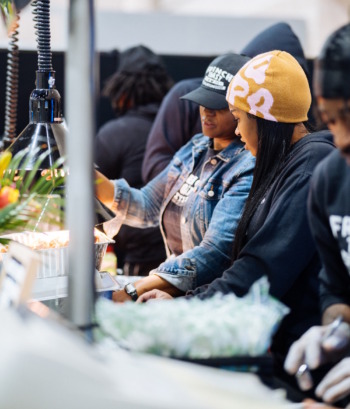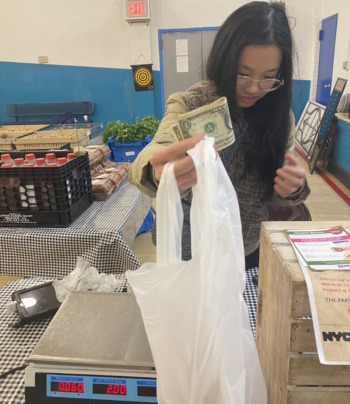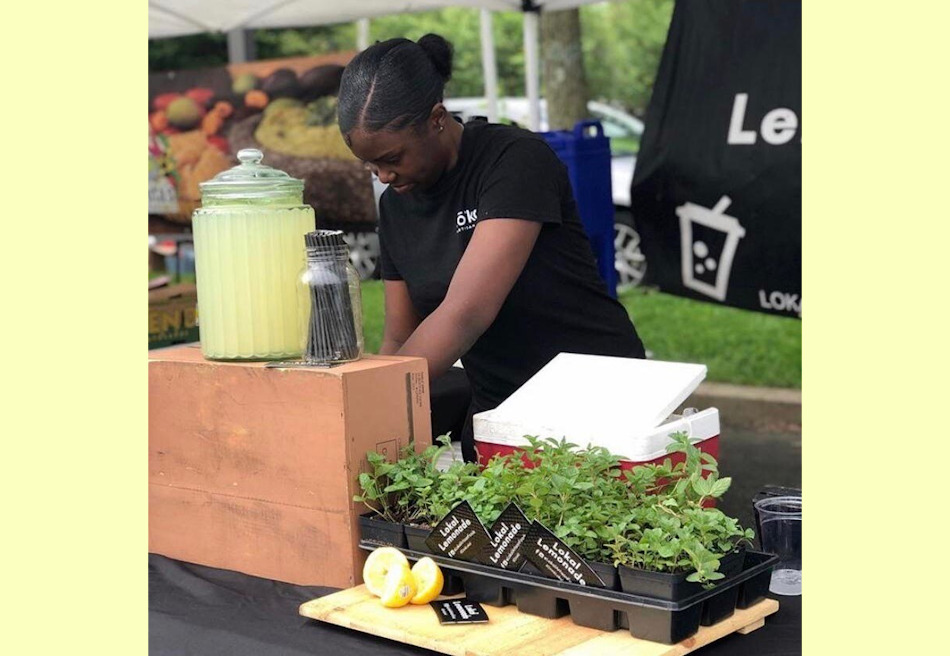Editor’s note: Youth Today interviewee Charisse McGill, the nationwide Farmers Market Coalition’s most recent executive director, died suddenly on January 18, as this news article was being scheduled for publication.
At a Lansdale, Pennsylvania farmers market, Madison McGill started learning math by having to correct herself whenever she gave the wrong change to buyers of goods and produce sold by her mom and other vendors. Five years into being a little helper, when she was 12, Madison started selling lemonade infused with leftover lavender that farmers gave her, along with cash tips.
“There was nothing for the kids to drink. There was just coffee, beer and kombucha,” said McGill, now 18, who had started going to the market, which her mother managed, when she was 7.

Lokal Artisan Foods
Charise and Madison McGill working together on their French toast bites.
Baby, lemons aren’t local,” Charisse McGill, during interviews last fall with Youth Today, recalled telling her daughter when she first mentioned launching that venture at a market reserved for produce and products from the region.
Her daughter politely pushed back: “I’ll source fruit and herbs from the farmers market and I’ll have a new flavor every week.”
Her mom, convinced, loaned that daughter $350 to pay the market’s vendor fee. Charisse McGill also helped her daughter squeeze 88 lemons a week. “Because I wanted to make sure I got my money back,” added McGill, laughing during an interview late last year with Youth Today.
During her first few weekends of selling lemonade for $5 a glass, the young vendor grossed $6,000, which helped fund the start of a mother-daughter French toast food truck, Lokal Artisan. Run at Spruce Street Harbor Park in Philadelphia, it has employed Philadelphians 15 years and older, paying them $12 to $20 per hour plus tips. Pennsylvania’s minimum wage is $7.25 an hour, an amount many economists said doesn’t cover basic needs.
“They’re serving people in 100 degrees and 32 degrees, cooking up bacon. They deserve a living wage,” Charisse McGill had said.
In addition to, say, giving birth to an offshoot business and providing income for adults, farmers markets across the country have spawned youth markets that peddle produce and other goods. An income source for some participants, the youth markets also teach students about nutrition, while honing their social and entrepreneurial skills.
A New York youth market opened to combat anti-Asian hate crimes
Two Bridges Youth Farmers Market, on the cusp of New York City’s Chinatown and Lower East Side, emblazons its fliers and social media sites with “Stop the Hate, Spread a Healthy Plate.” A project of Hamilton-Madison House, a nonprofit organization, the market launched with an Asian American Foundation grant in 2022 after what police reported was the area’s rise in hate crimes against Asians. Funds from the New York City Department of Youth and Community Development keep the market running.

Reyna Gobel
Sophia Xu selling produce at the Two Bridges Youth Market.
“The neighborhood has an abundance of fast food restaurants, but it doesn’t have easy access to fruits and vegetables,” said Bob Lewis, who, as co-founder of New York City’s State’s network of Green Markets, also has helped Two Bridges.
The youth set up tables of produce that they sell. No adults are on the sales team, which is overseen by an adult coordinator.
Paid weekly, each student is there for his or her reasons. Sophia Zhu, 15, enjoys talking to elderly shoppers and helping them select fresh fruits and vegetables. Also, said Zhu, who is considering becoming a chef, “I love playing with [our customers’] … dogs and getting away from my little brother.”
Like Zhu, Alexander Xu, 16, helps translate English into Chinese for some customers. “I want to be an entrepreneur and open my own business,” Xu said.
Adrianna Farmer, 15, loves smelling the herbs and learning about the produce. Her family members didn’t shop at farmers markets before, but now they do, Farmer said.
[Related: Teen farming feeds the needy in touristy corner of Massachusetts]
Centering Chinese, Mexican, Chilean, vegan and other dishes, cooking demonstrations for farmers market shoppers and the teen volunteers aim to reflect the needs and culture of the community, said Lewis, the Green Markets co-founder. Sammy Diaz, executive chef at Republic Restaurant in Washington, D.C., has demonstrated how to make squash with chimichurri sauce. Donna “Chef Rootsie” Davis, of Veggie Grub in Brooklyn, made a dish whose ingredients included grains, carrots and collard greens. Nutrition educators from the New York City Health Department bring their know-how to demonstrations, too.
California market serves region with many poor farmworkers
On the other side of the country, in Woodside, California, Yolo Food Bank’s Student Farmers Market provides edibles, teaches students to make healthy eating choices and works to lessen the shame that some feel about having to ask for free food.
“During the pandemic … a lot of first-time individuals and families came to access free resources,” said Maria Segoviano, Yolo’s director of development and communications. “We found that the youth markets were a great way to reach families because we’re reaching them through their kids.”
Using play money provided by the food bank, kindergarteners through 5th-graders at what the food bank’s website says is 18 participating schools among the county’s 61 public schools can buy produce that mainly has been donated by local farmers. The schools serve some of the poorest students in California, one of the nation’s top agricultural producers.
Advice for youth market vendors
As a starting point, Madison McGill suggests that an interested student “volunteer before you commit to being a vendor in a market or working in a youth market program.”
“Vendoring takes a lot of preparation and you will do some heavy lifting when you pop those tenets out,” she said.
Asking farmers, relatives and teachers, she added, who are involved in the market for help is another good idea. Don’t be discouraged or dissuaded by those who don’t believe in your efforts, she added.
[Related: Young farmers adapt to a hotter, drier future]
“I had shown my teacher the local website for the lemonade business,” the teenager said. “She thought it was a project that I had to do for a different class. She didn’t think it was real … ”
“Kids had all kinds of ideas,” Charisse McGill had told Youth Today. “I supported them all because it’s their vision.”
Added her daughter: “Have an easy brand name that people can memorize, and they’ll see it over and again. And just be in the people business rather than trying to sell people. They want to have a connection with you and hear your story — like mine of just wanting something other kids like me could drink at the farmers market.”
***
New York-based author and journalist Reyna Gobel covers personal finance, health and travel. Her work has appeared in CBS Money Watch, Money, The Fiscal Times, Harvard Health, Reuters Health and other publications.




























